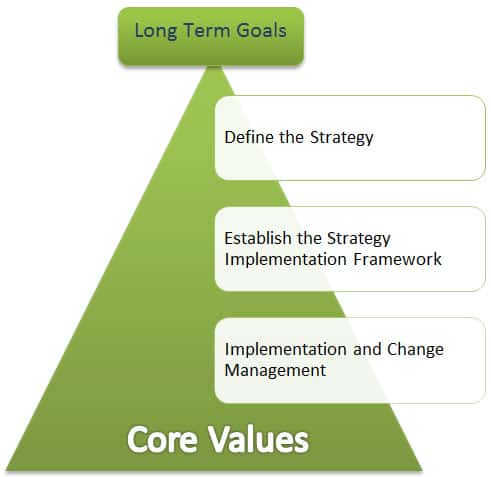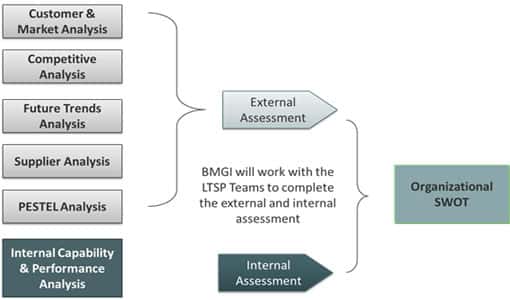Business Strategy planning is a regular task undertaken by every organisation. Strategic planning usually involves fundamental choices about:
- The mission, goals, or vision the organization will pursue
- Whom the organisation will serve
- The organization’ role in the community
- The kinds of programming, services or products the organisation will offer
- The resources it would need to succeed – people, money, expertise, relationships, facilities, and so forth
- How you can they best combine these resources, programming and relationships to accomplish the organization’s mission
Companies have developed sophisticated methods to consider different parameters while strategizing short or long term goals. But studies have shown that 8 out of 10 times the strategy doesn’t work the way it is intended to. The reasons behind the non-performance of strategy are many but if a structured thinking is applied, the reasons can be grouped into one or the other few main parameters that affect strategy planning. At BMGI, we have analysed and partnered with many companies in their strategy planning process to generate meaningful patterns behind a successful strategy. It is now clearly known that rejection of any crucial parameter in strategy planning will only yield unrealistic strategic plan. It is found that while many companies use past performance data to predict the future, they miss out on assessing current market dynamics that can change the existing conditions drastically. Even if few companies do take market dynamics into account, they follow what all others are doing and lose the opportunity to leverage innovation. Even if a company takes the daunting task of innovation, rarely it succeeds since it does not take into account different scenarios which may arise as a result of the innovative strategy employed. And in the rarest of occasions if a company prepares itself by assessing various scenarios it fails because of not taking measures to mitigate risks that arise as a result of various scenarios. In short the essential of strategy planning must cover:
- Past and present data analysis
- Insightful analysis of market dynamics
- Following a unique approach to planning
- Scenario analysis based on relevant inputs
- Risk mitigation measures to minimize loss
Intricately embedded in the above statements is the consideration of short as well as long term strategy which connects the dots as the organisation grows.
BMGI’s Approach to Strategy Planning
BMGI has worked with numerous organizations and developed intricate understanding of the strategy planning and development process and its impact on shareholders. Through extensive research BMGI has developed a robust, structured and exhaustive strategic planning process which takes care of all dimensions and helps organizations answer the most crucial questions in the grey area.
We begin with clear understanding of core values of the organization and long term goals they wish to pursue. BMGI’s approach maps these two based on the following framework:

To complete the strategy planning spectrum, BMGI not only helps organizations define the strategy, but it prepares a well laid out plan for its implementation too. The defining process of strategy includes all the crucial variables which might affect the outcome to the business. BMGI’s structure Defining framework of strategy includes:

To establish clear linkages between strategic developed and its flow to the long term goals, BMGI uses structured Balanced Scorecard (BSC) and Hoshin Kanri methodology across the organization to develop detailed strategy maps for implementation that spans across all important parameters such as learning, growth, process excellence, customer strategy and financial considerations. This leads to identification of crucial risks and prepares the organisation to develop the right strategy that is scalable and have specific action points to realise the plan into reality.
Impact Areas
BMGI’s continuous focus on specific areas has delivered tremendous benefits to organizations through strategy formation and implementation. We have partnered with organizations in the strategic areas –
- Organic growth strategy – Organic growth is slow but continuous. It comes with strong foundation which makes the company sustainable. Few companies survive the organic growth route, but those who manage to do it, becomes a leader in its industry.
- Business unit strategy – Each business unit needs its own strategy that ensures economic growth as a unit as well as a whole organization.
- Corporate strategy – Corporate strategy decides the direction that whole company would take. Careful consideration of industry and core competencies are needed to commit to a direction and faithfully follow it.
- Emerging markets strategy – With the third world set to become the dominant economic force, it becomes important for every company to have a strategy for the economy that is clocking double digit growth.
- Sustainable growth strategy – When future is uncertain and full of cautions, it is important to choose your business strategy that smoothly navigates the future and creates a safe place for its own.
